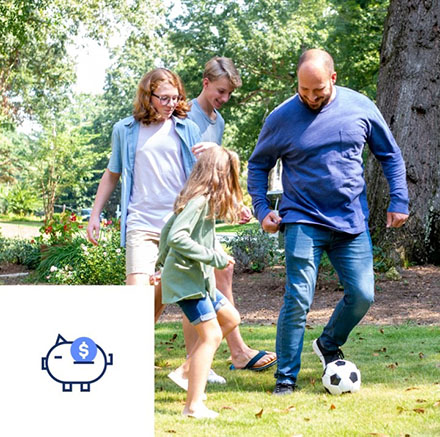- Insurance Guide
- Money Management
- How To Make A Personal Budget
The importance of budgeting and how to create a budget that fits your lifestyle

Let’s dive in and explore some tips and approaches for how to budget money—everything from how to start budgeting, to the best apps for budgeting.
Why budgeting matters
Budgeting is about more than living within your means and tracking your spending. It’s about finding concrete ways designed to help you reach financial goals like lowering debt, planning for retirement, or saving for a big purchase. What’s more, not having a budget could lead to stress, overspending, and a poor credit score. Who wants that?
Money in versus money out
Most budgeting journeys typically begin by assessing your income. Start by combining after-tax pay from all sources—whether it’s from a single job, multiple jobs, or self-employment—and be sure to allow for flexibility if your income fluctuates month to month. Next, tally up expenses starting with things like housing, groceries, debt payments, utilities and insurance. Don’t forget to include other expenses like dining out, clothing, entertainment, and subscription services like Netflix. You can find most of this information by looking at pay stubs for income and banking accounts for expenses. Then it’s simply a matter of subtracting your total expenses from your income to see if you have any money left over, or need more to cover a shortfall.
Start small
Effective budgeting often begins with small steps to build confidence. You should set realistic spending limits based on your income, and remember to plan for irregular expenses like holidays or car repairs. Consistency is key, so make budgeting a regular part of your financial routine. And don’t forget about savings, the money you put away for the future. While technically not an “expense,” you should consider savings as “money going out” when thinking about the budgeting process.
Give yourself time to adjust
You shouldn't expect to become a budget pro right out of the gate. Small setbacks are common and the same approach might not work from year to year, so don't be afraid to switch things up if necessary.
Involve your loved ones
You may want to work with your partner to decide on monthly spending and discuss your short-term and long-term financial goals. Look over what you've got in your account(s) and go from there. And as you review things as a team, be sure to consider individual needs, and if one partner tends to overspend, have an honest conversation about where to make adjustments.
Consider adopting the 50/30/20 approach
Once you have a clear understanding of your finances (earnings minus expenses), you may want to craft your budget using the 50/30/20 structure. Here’s how it works. You put aside 50% of your income to cover essential expenses like housing and utilities, 30% for personal spending such as entertainment or dining out, and 20% towards debt repayment or savings. Just remember, while these percentages provide a useful guideline, feel free to play with the numbers and change them around based on what you think best suits your individual lifestyle. At the end of the day, it’s about striking a balance designed to promote financial health and stability.
Zero-sum budgeting may be the way to go
Zero-sum budgeting helps you plan how every dollar and cent you earn gets used from month to month. Income is designated to cover specific expenses like housing, transportation, and entertainment. Then, whatever remains gets stashed into savings. By creating categories for major expenses and line items for smaller ones like dining out or shopping, the goal is to stay on track with your money from start to finish every month while you’re living on a budget.
The best apps for budgeting are at your fingertips
While there’s certainly nothing wrong with using pen and paper as part of your budgeting process, you may prefer the convenience of apps for budgeting your money. Lots of people find them easy to use for tracking cash flow and monitoring expenses. They feature several price structures and most may even be free. From Credit Karma and YNAB (You Need a Budget), to online banking apps with features like automatic bill pay, there’s no shortage of technology out there to help. You can also try using one of our budget-focused resources.
Think about today and tomorrow
The budgeting process typically begins with short-term goals like tucking away money for a new car. You may want to consider family budgeting in the event of your passing. Life insurance could provide essential coverage and spare your family from financial burdens. If you’re interested in purchasing life insurance as part of a new commitment to financial wellness, consider reaching out to TruStage™. Our licensed agents could help you find a term or whole life insurance plan designed to work best for you.



